This post may contain affiliate links. Please read our disclosure policy.
This DIY natural all-purpose citrus cleaner is made with just two ingredients, contains no harmful ingredients and – more importantly – is effective.
Make-up, cleaning products, deodorizers – we’re constantly surrounding ourselves with all kinds of chemicals. Cleaning products, in particular, can contain harmful chemicals that are bad for the environment and us. With that in mind, I decided to try making my own all-natural cleaning products – starting with this citrus peel cleaner.
This all-purpose cleaner is perfect for a wide variety of counters and surfaces, for mould and mildew, in the kitchen, bathroom and living room. Plus, I love to use it to wipe down all sorts of surfaces and handles during the winter months, while the lurgy is going round (doorknobs, light switches etc.)
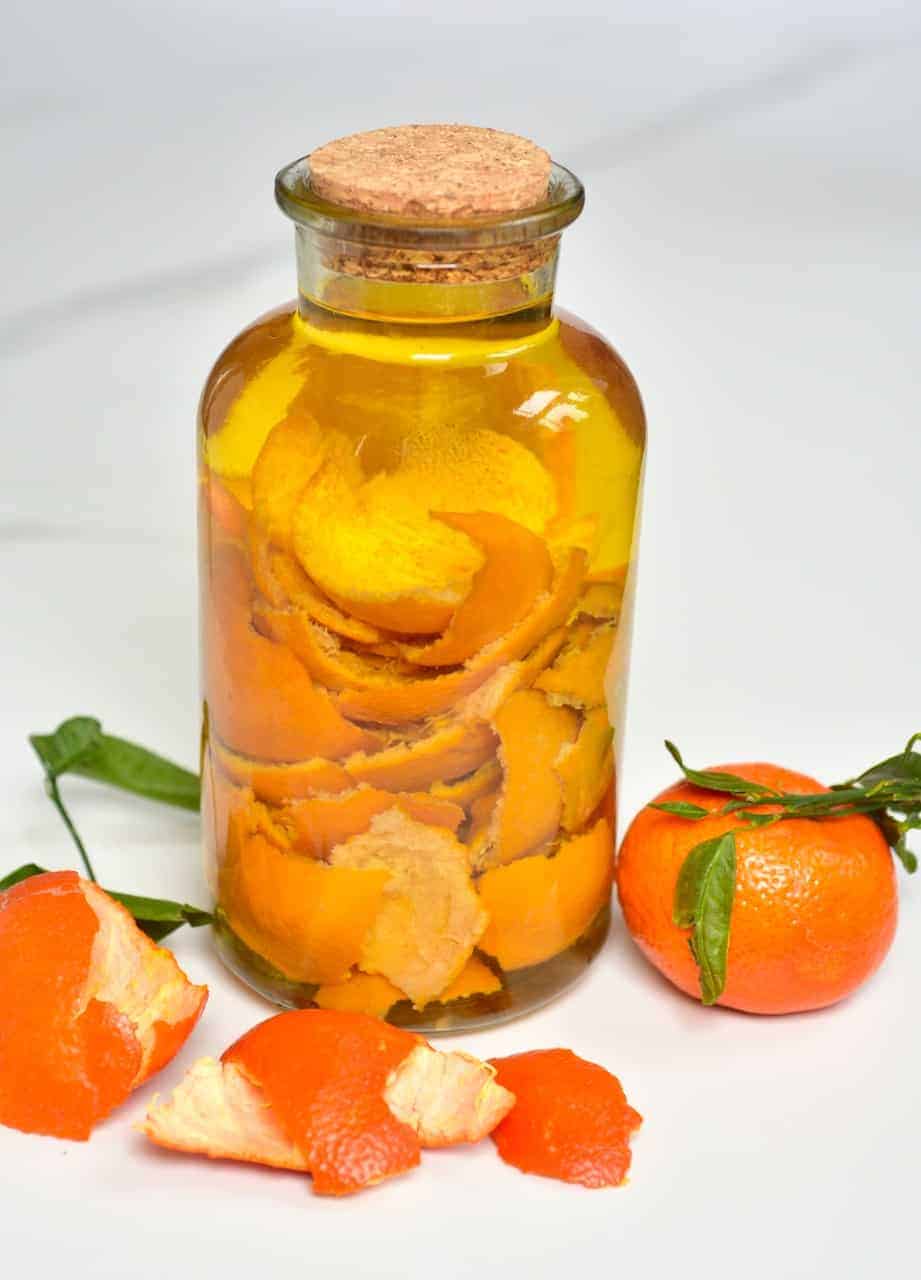
Why Make Homemade Cleaners?
The most significant point on this list would be to avoid toxic chemicals. While the idea of chemical cleaners may seem like you’ll get a better clean – natural homemade cleaning products can be super effective. Plus, you avoid the chance of even a single nasty chemical element working its way into your system in any way.
Pick up any of the cleaners you have around your house and look what’s inside. I could probably do an entire series of blog posts on all the reasons why you don’t want the majority of those ingredients near you or your skin. This goes tenfold for if you have children in the house who like to stick things in their mouths.
However, rather than scaremongering you about the various dangerous chemicals, instead, I’m going to take the positive road by telling you how fantastic vinegar and this cleaner are! And, if you do want to read more about the bad chemicals then here you go.
For me, the discovery actually came because of my new DIY obsession and interest in a low-waste lifestyle. I always knew that household cleaning products were full of chemicals – and that, yes, some definitely aren’t good for us. Oven cleaners probably being one of the most terrifying- with instructions that may as well say ‘dress in hazmat suit before applying’.
However, it was only when I was trying to think of ways to use up my leftover citrus peels, that it dawned on me; An all-natural citrus peels cleaner!
Within the past year or so, I’ve started using more all-natural cleaning products around my house and I now always has some white vinegar in my cupboard and baking soda.
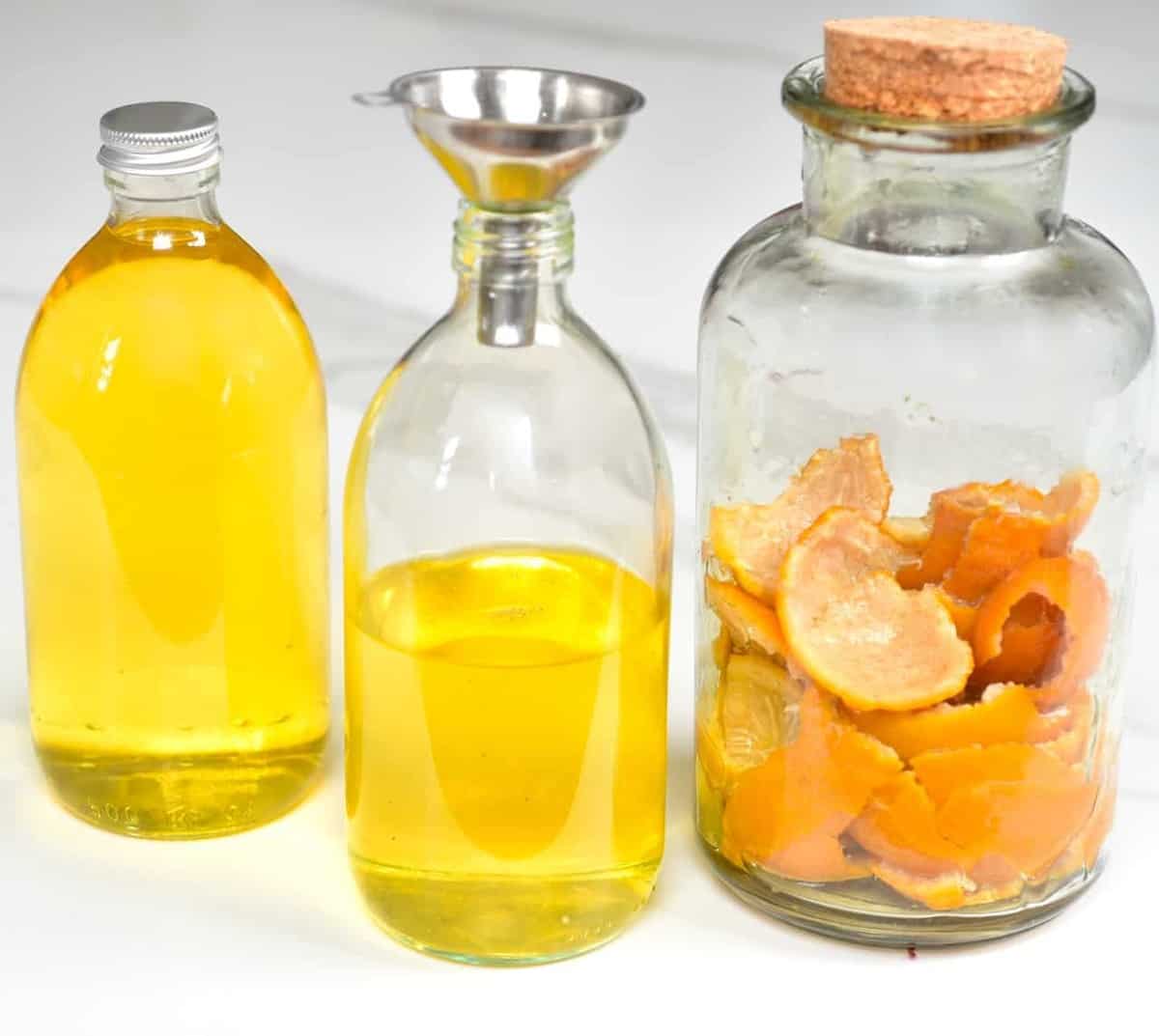
You actually might be surprised at all the ways you can use vinegar to clean
Vinegar is a cheap, natural all-purpose cleaner that actually works amazingly. This is because it’s mildly acidic – which helps it cut through grease, grime, and all the bacteria and mildew we want to rid our houses of. It’s also a disinfectant and cant work to tackle a variety of bacteria.
Perhaps surprisingly, vinegar is also a fantastic odour neutralizer – working well for even some of the most potent of smells. You may not think that would be the case – what with it having quite the distinct smell itself. However, it can be perfect for those with cooking odours and even pets.
On this particular post, I include a recipe for a cheap, simple all-purpose cleaning spray. The spray can be used on a variety of surfaces, as you would with other ‘all-purpose’ style cleaning agents.
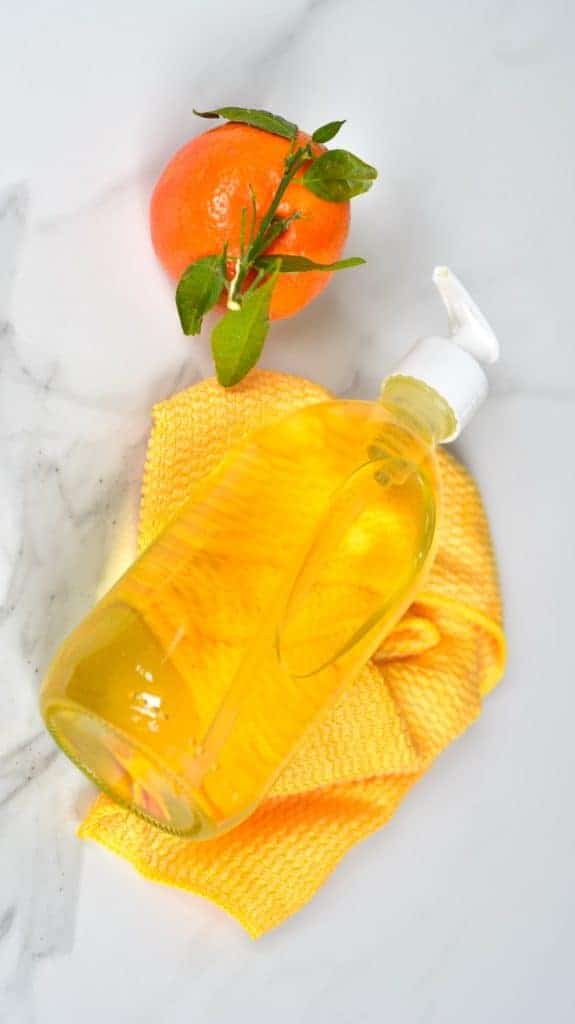
However, it’s worth noting that there are a variety of ways you can use white vinegar now, in your household:
- White vinegar can be used during various parts of your washing machine cycle to whiten, brighten, improve odours and even soften. I first heard about adding a capful of distilled white vinegar instead of fabric conditioner and how this makes your washing smell even nicer, as it enhances the scent of the laundry detergent and removes soap residue ( and it worked for me!).
However, since then I’ve found out that you can use vinegar at almost every stage of the wash; to pre-treat stains, in place of detergent ( don’t use them at the same time, as they tend to cancel one another out), combined with a couple of other ingredients to make a homemade bleach, it can also help lint buildup in the last rinse cycle of the wash.
- It’s a brilliant natural toilet deodorizer – simply pour around 125ml into the bowl and leave to sit for 20 minutes then flush.
- Similarly, it will work as a wonderful room deodorizer too, picking up all odours from smoke and garbage to pet and body odours. Simply fill a shallow, wide dish in the room ( you want a lot of surface area for the vinegar) and leave it to do its job. It will smell vinegary itself – but will work to trap all the nasty odours from the room.
Top Tip* To get rid of powerful odours that have taken over your house then you might want to try simmering vinegar. One particular food project I worked on around a year ago led to a very stinky living room. I simply brought out my electric hob ( you can also use a crockpot) and simmered about a cup of vinegar in the pan.
The vinegar begins to evaporate into the air, creating a powerful anti-odourer (is that a word?) that picks up the bad smell molecules, and worked like a charm. I can’t remember exactly how long I simmered it for, probably between 1-1.5 hours – but it goes from smelling vinegar-y ( of course)to smelling of nothing, and I was SUPER impressed.
- Lastly, I already mentioned previously about how I stocked up on baking soda at the same time as vinegar and this is why; When mixing the two, you can create an excellent paste that works to clean deep grime. I’ve also used a heated vinegar and baking soda mix to unclog drains – wowee that worked!
I’ve heard a couple of people try to dispel the use of the two together, essentially saying that after the ‘fizzing’ reaction, you’re left with something fairly useless. Personally, I’ve not found that to be true. Although I will often wipe my surface THEN add the baking soda and a little bit of elbow grease – works like a charm.
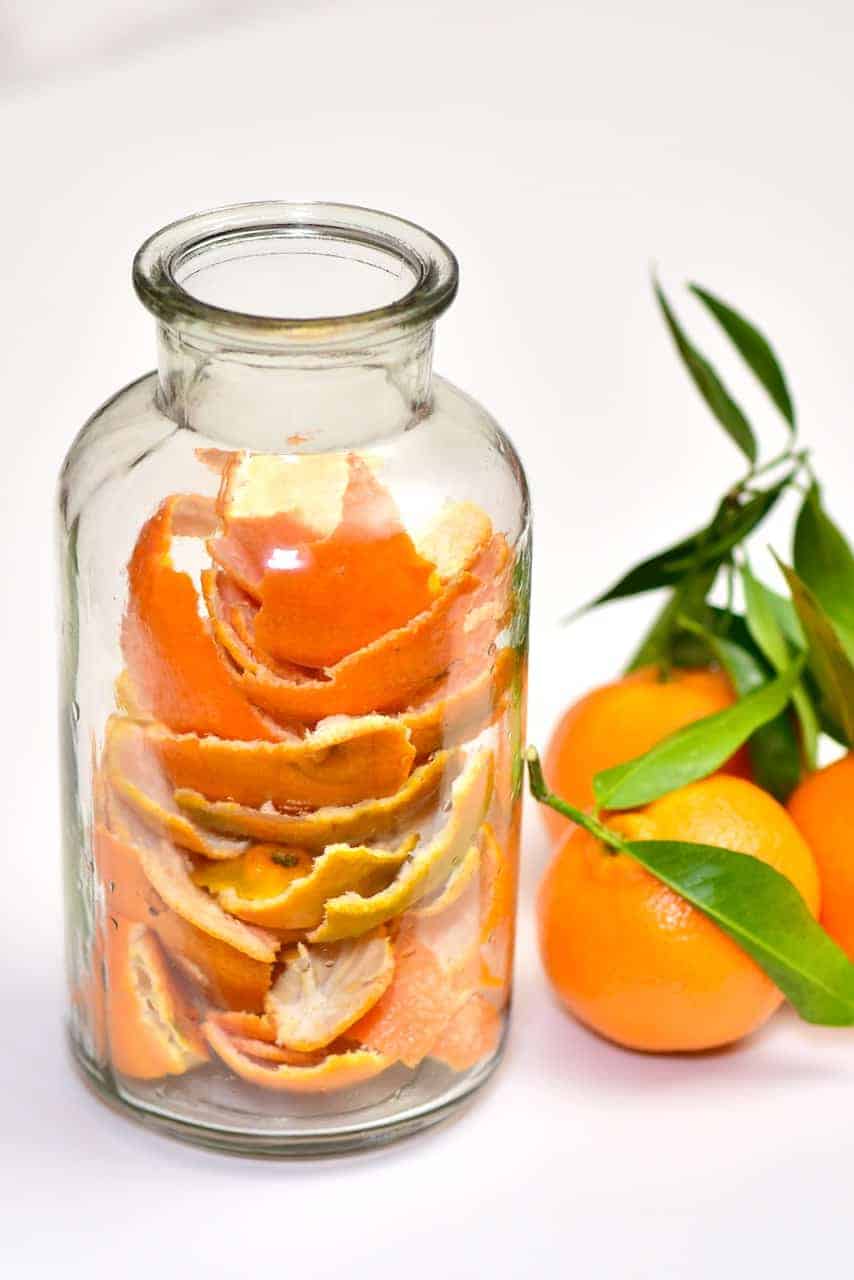
Why add Citrus Peels?
Now that you know how fantastic vinegar is on its own you’re probably wondering why to bother adding citrus peels in the first place. Well not only does it help to neutralize some of the vinegar smell with a fresh, fruity one, but citrus peels also contain an oil called limonene, which is a powerful solvent for grease and dirt.
You can use a variety of citrus for this cleaner – including grapefruit, lemon, orange, clementine etc. or even a combination of a few of them. For people who want a stronger smell then feel free to add a few drops of essential oil.
I also find that adding citrus peels helps to extend the use of something that is typically thrown away ( and yes, the leftover peels post-soak can be composted). I tried eating citrus peel, after reading about their potential, but I couldn’t get past the bitter taste.
Luckily when using this cleaner, you’ll find that the vinegar smell disappears once it dries. However, the citrus scent lingers wonderfully.
Note* I think is super important to note that, if you have a household with cats, D-Limonene is a poison to them. It can be found in citrus essential oils as well as a variety of household cleaning products – so be aware, and it t may also affect dogs, however in larger quantities. Unfortunately, I don’t know too much about this as I have no pets.
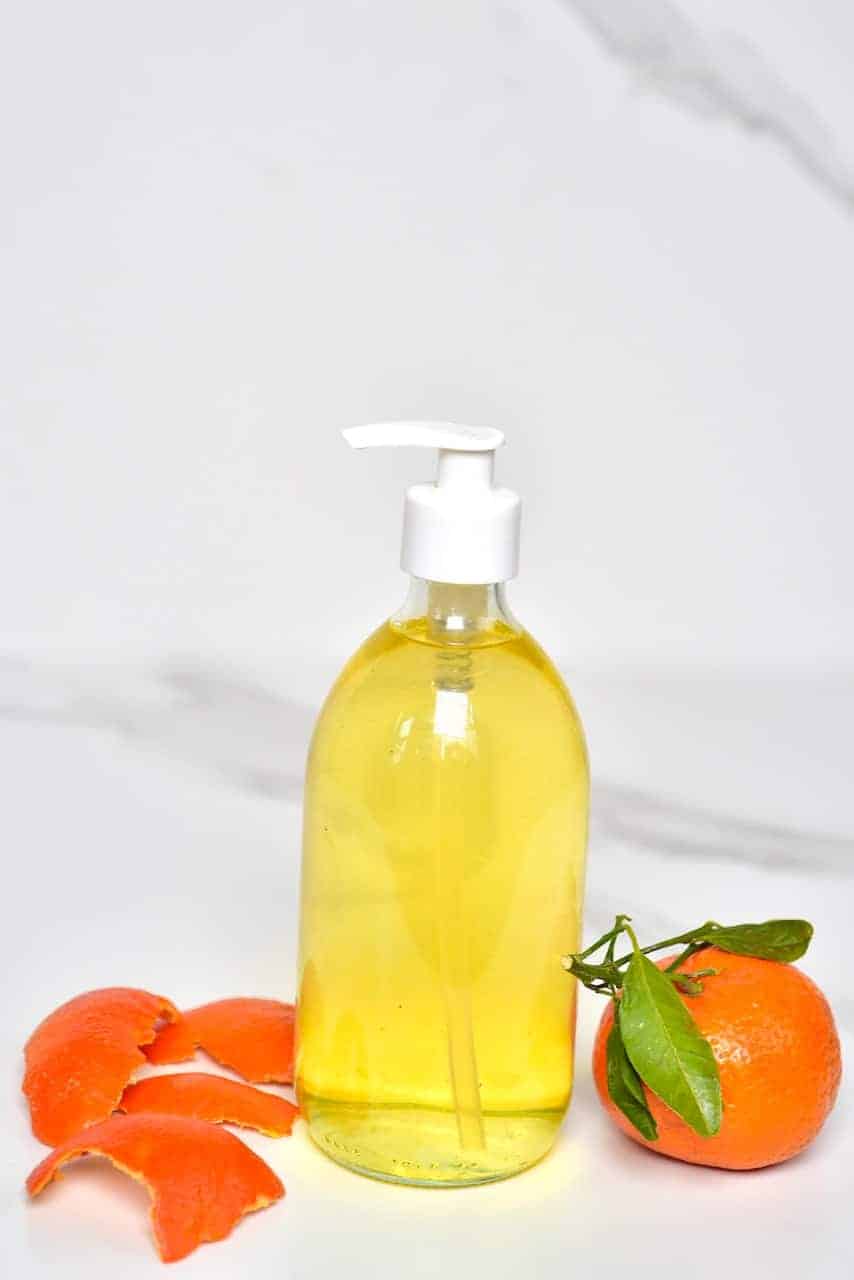
My Favourite ways to use this spray
- Next time you clean your refrigerator, then this vinegar spray can help to deodorize and neutralize smells. Just spray the cleaner onto your shelves and side of your fridge and wipe down. The vinegar not only cleans but also helps to eliminate lingering odours that have clung to the surfaces. When I moved house, I did this alongside placing some baking soda in the fridge ( which helps to pull odours from the air) – to keep my fridge fresh while unplugged.
- Berry, beet, pomegranate and other food stain are the bane of my food blogger existence ( okay, maybe not that dramatic – but still). I am constantly whipping up new recipes and often creating a lot of mess. Next time you make a mess, whip out this handy cleaner, and it will help to rid your surfaces of stains.
- As an all-purpose cleaner to wipe down counters, doorknobs etc. as well as use within the bathroom for mould and mildew.
Note* It also works to help get stains off your hands. However, I’ve found that undiluted vinegar will often be best for tougher stains.
Where NOT to use the citrus cleaner
- While there are 1001 uses for this cleaner, there are also a few places you SHOULDN’T use it. Because of the acidic nature of vinegar, it’s best to avoid using this on granite and marble surfaces.
- Also, as mentioned above – if using citrus peels and/or essential oils with d-limonene – this is toxic to cats and should be used with caution.
- Although it can be used with some woods – I’d suggest caution as the acid can have adverse effects on certain wood finishes.
How to make the Natural Household Cleaner Recipe
Needed
- Citrus peel – orange, lemon, grapefruit, clementine. Use any from the citrus family.
- White vinegar
- Clean sterilized glass jar
- Spray bottle or pump bottle (this time I used a pump, as my spray bottles are currently in use)
Note* It’s hard to give exact amounts of peel and vinegar as this depends on which fruit you use (as the peel size varies) and how much citrus-based cleaner you want to make.
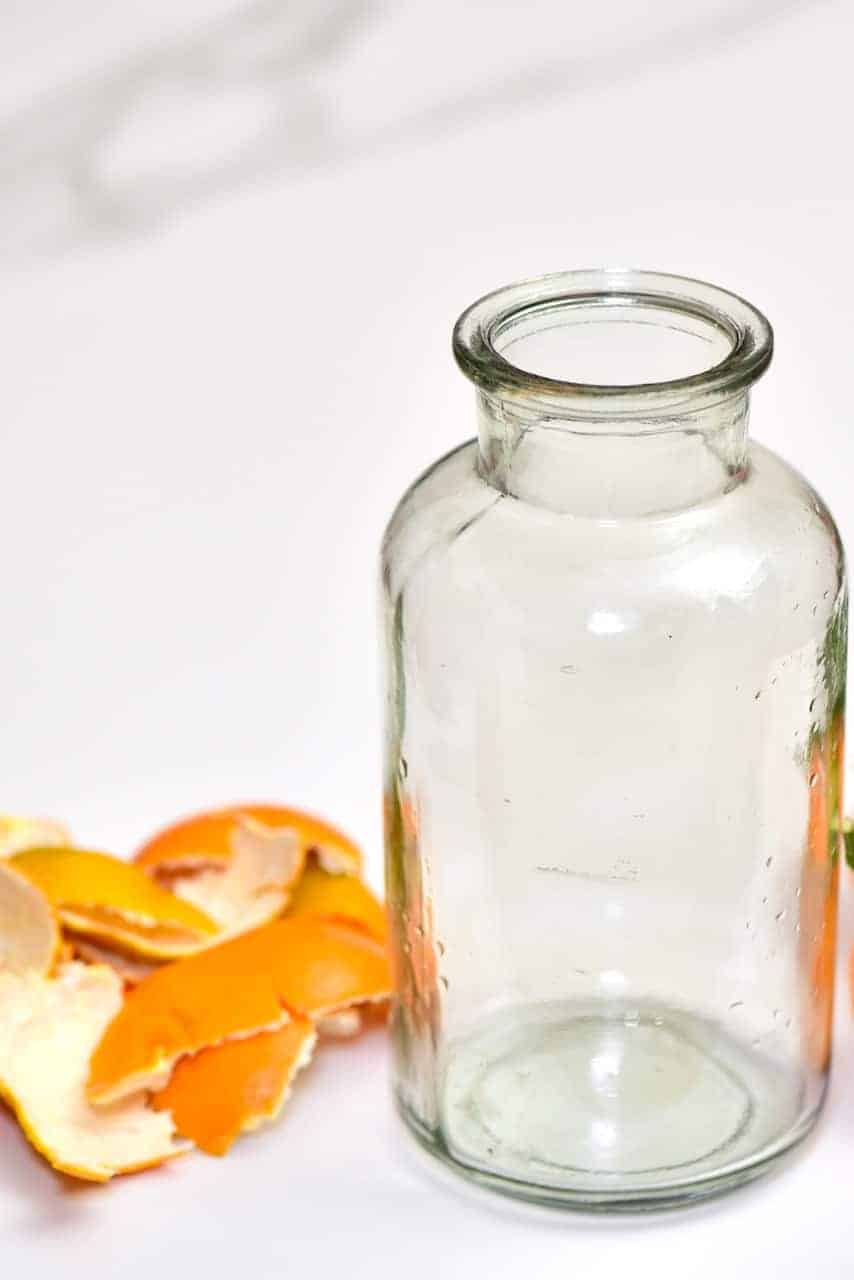
Fill a container with citrus peel. Your choice which you’d like to use – or even combine.
Note* If you’re not a massive citrus eater then you can begin the process of collecting peel in a bag in your freezer. Swap this to a jar, once you’ve collected enough.

Pour the vinegar into the jar, making sure all the peels are fully submerged.
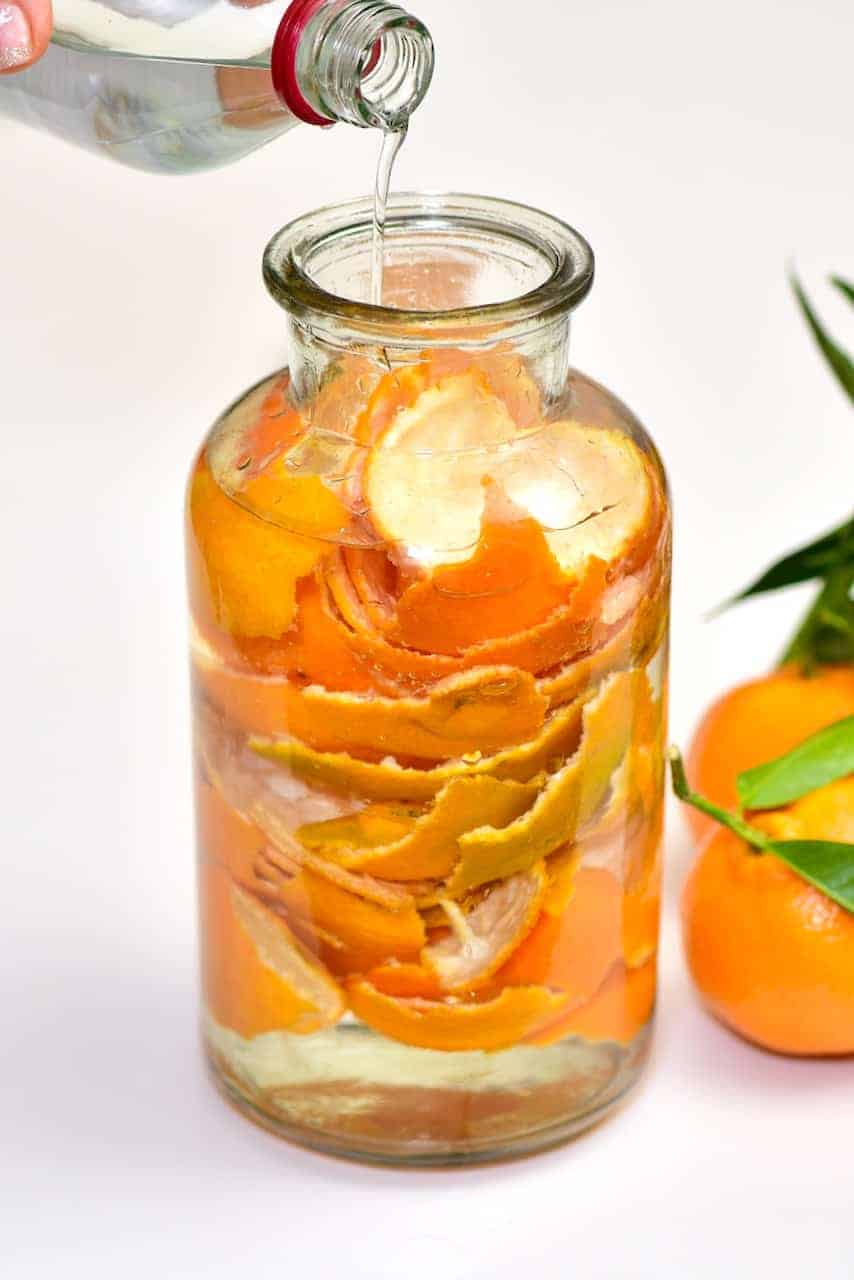
Leave it to rest for at least one week. I often leave mine for two.
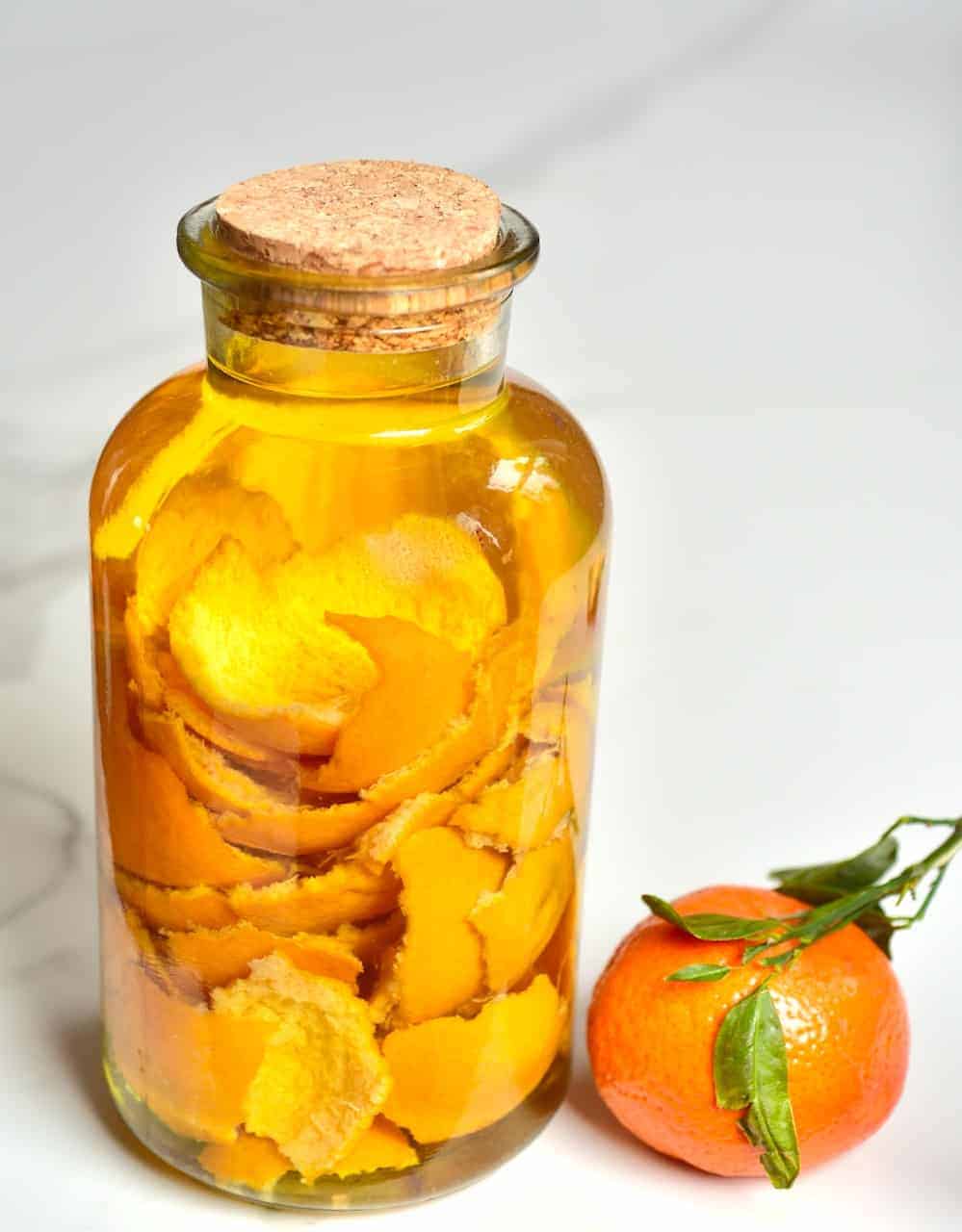
Pour in a spray or dispenser jar/bottle.
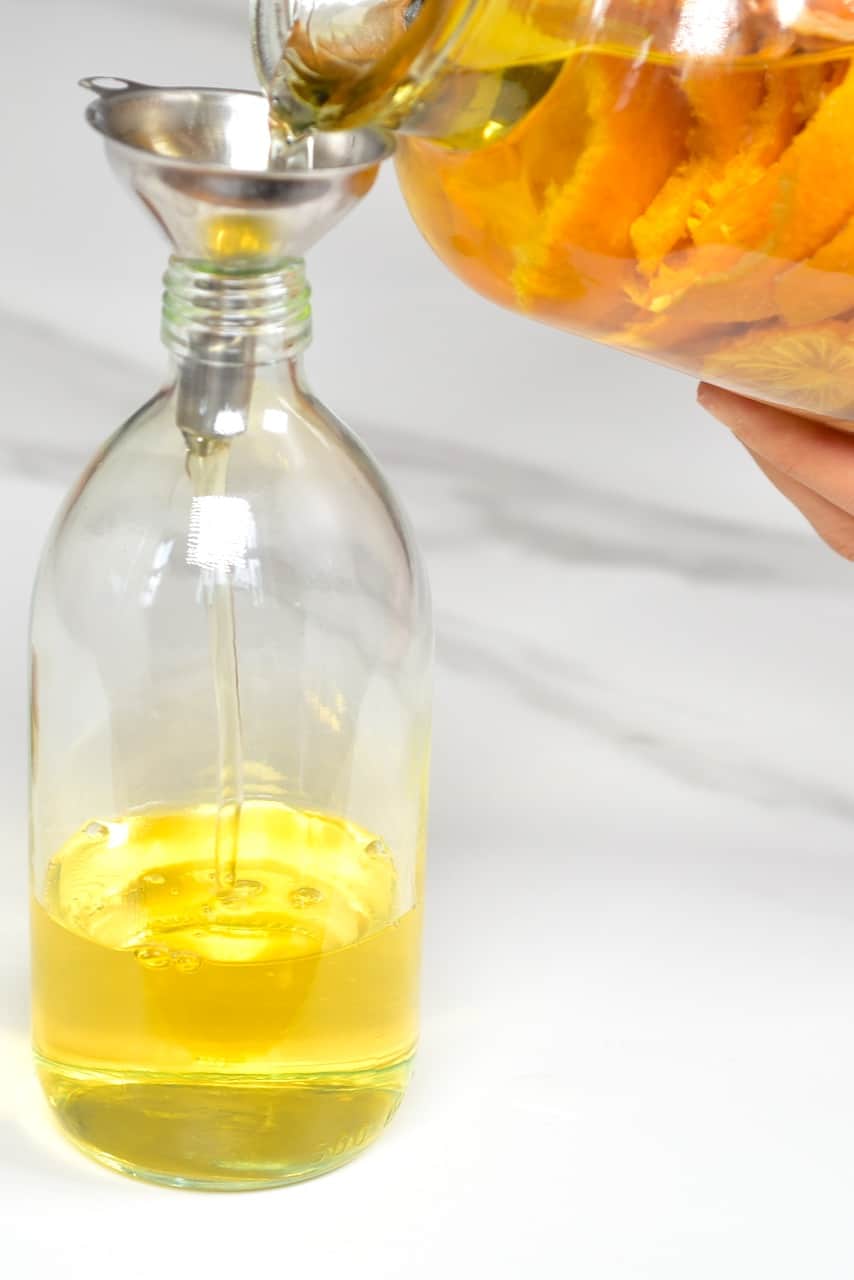
Dilute with fresh/filtered water with equal parts 1:1 – one part concentrated cleaner, one part water to use as a spray.
Note* I usually separate my mixture so some is diluted and some is kept un-diluted for different cleaning needs.
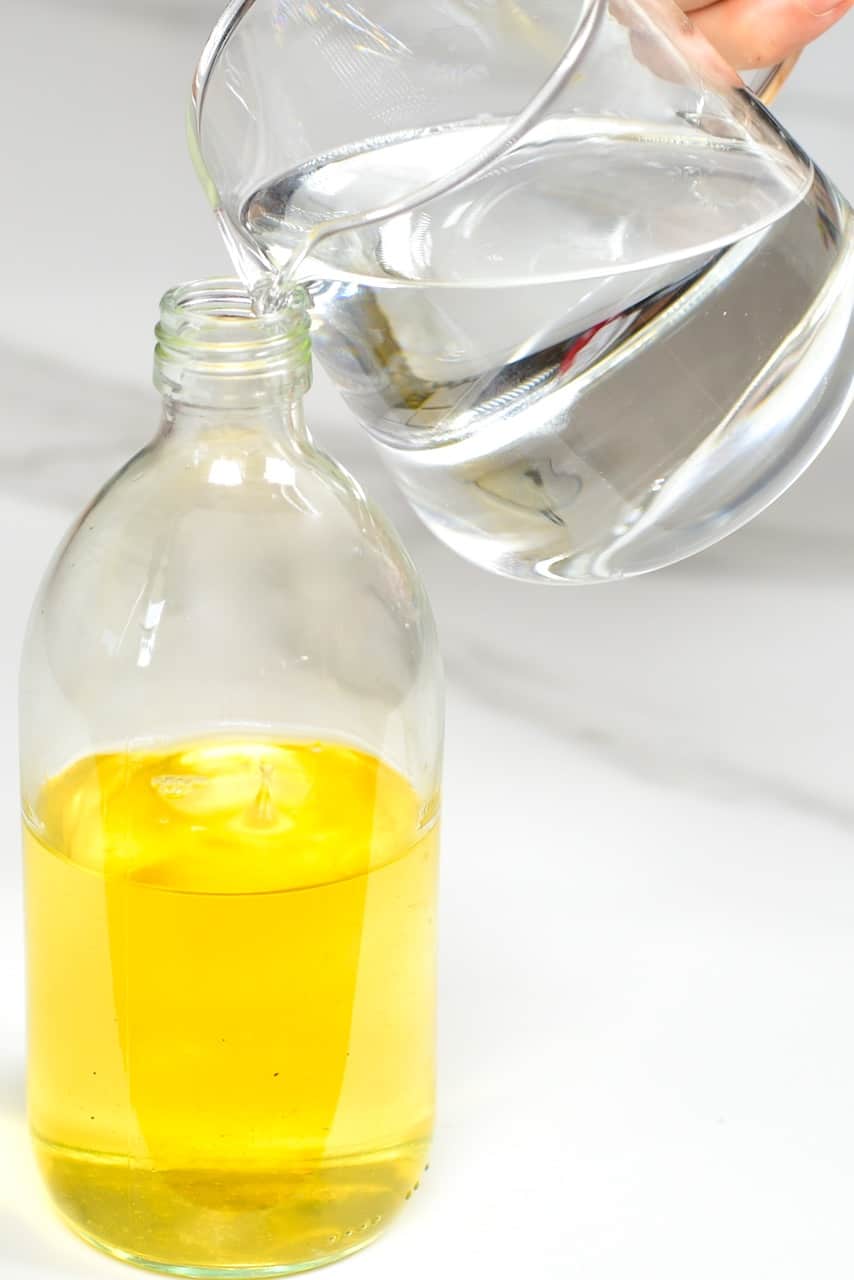
Note: The colour of the diluted liquid will change a bit.
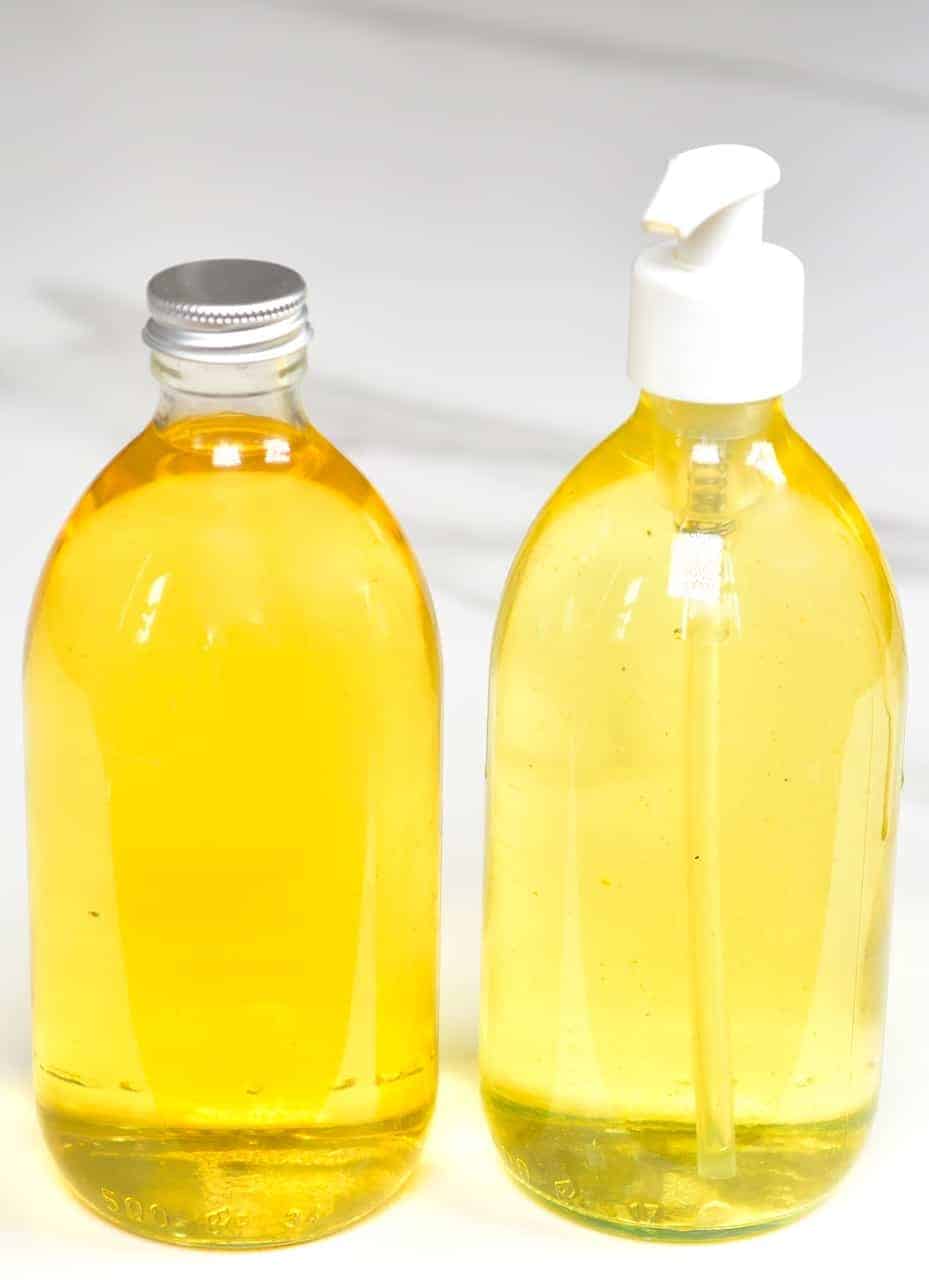
And voila, your natural citrus cleaner is ready to be used as and when needed.
If you have any questions, then feel free to ask them in the comments below. You can also tag me in your recreations on Instagram @Alphafoodie – I’d love to hear how you use this cleaner!
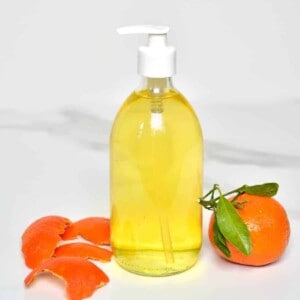
Natural Non-Toxic Citrus Cleaner
It's a wonderful non-toxic spray to use around your house to cleaning a variety of surfaces, for mould and mildew and to keep germs at bay when its cold/flu season
Equipment
- Clean sterilized glass jar
- Spray bottle or pump bottle (this time I used a pump, as my spray bottles are currently in use)
Ingredients
- Citrus peel - orange lemon, grapefruit, clementine. Use any from the citrus family or even a combination
- White vinegar
Instructions
- Fill a container with citrus peel. Your choice which you'd like to use - or even combine. *
- Pour the vinegar into the jar, making sure all the peels are fully submerged.
- Leave it to rest, with the lid on, for at least one week. I often leave mine for two if I have the time.
- Strain this mixture and pour in a spray or dispenser jar/bottle.
- Dilute with fresh/filtered water with equal parts 1:1 - one part concentrated cleaner, one part water to use as a spray. Note* I usually separate my mixture so some is diluted and some is kept un-diluted for different cleaning needs.
- And voila, your natural citrus cleaner is ready to be used as and when needed.
Video
Notes
Where NOT to use the citrus cleaner
- While there are 1001 uses for this cleaner, there are also a few places you SHOULDN'T use it. Because of the acidic nature of vinegar, it's best to avoid using this on granite and marble surfaces.
- Also, as mentioned above - if using citrus peels and/or essential oils with d-limonene - this is toxic to cats and should be used with caution.
- Although it can be used with some woods - I'd suggest caution as the acid can have adverse effects on certain wood finishes.

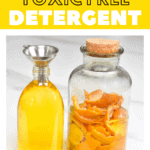
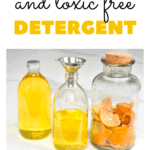
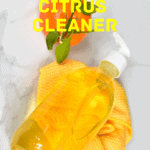









Thanks for sharing your knowledge with us!
You’re very welcome, glad you liked the article!
Hi,
Lovely recipe. I remember my mum used vinegar to clean windows (make them so shiny) even furniture. Back than it was the best cleaning product. I have just 1 question (great description ) when you leave the citrus bits to soak in vinegar for a week or 2 where do you store it? Cupboard? Does it need to be out of sunshine?
Thank you!
Hi Eva,
Thank you for your comment!
It can be kept in a cupboard white it’s soaking. 🙂
This cleaner works wonders and is so easy to make!
Thank you so much for your comment, Lyam.
I have cats and one of the reasons I thought about this was to spray a little bit behind my couches because they are pooping back there
I hope this helps, Jamie 🙂
You are Amazing I like it thank you for all information you write ❤
Hi, I don’t like the smell of vinegar so if i boil the vinegar and then store it with citrus peels…does it still works and any tips to remove the smell of vinegar?
Hi,
I don’t recommend boiling the vinegar. When you use this solution, smells like vinegar just for a second. The vinegar scent quickly disappears and you are left with a fresh citrus scent. I hope you give it a try.
Great cleaner recipe and I love that I can use the peels after juicing! Thanks for adding all the safety tips below the recipe 🙂
You’re very welcome, glad you liked it 🙂
Hola! When you finish the product can you use the peels again for the same purpose? Refill it with vinegar or should I discard them? Thnks!
Hi Paulina,
It’s best to discard the peels and use new ones for the next batch. I hope this helps.
Can this be used to wash fruits & vegetables?
Hi Sri,
This is a household cleaning spray solution so I would recommend only using it for different surfaces like kitchen counters, sinks, bathtub, stainless steel appliances, on tile, etc.
I hope this helps.
With what superficies it can be used? If it’s not recommended in wood, marble and granite?
Hi,
can I use Apple vinegar instead?
I know that apple cider vinegar can be used for certain cleaning products. I haven’t personally tried to swap them for this cleaner – but I would think that it would work 🙂
Hi,
How long can it be used? Does it expire?
Hi Marietta,
This cleaner technically does not expire. The overall acidity of the vinegar can diminish, especially when exposed to air and sunlight. So it’s best to store the cleaner in a dark cool place (like a cupboard or pantry).
Use to clean my dog with a wet cloth and a few drops of white vinegar, and helped a lot with the undesirable smell.